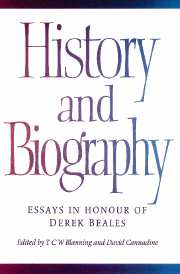Book contents
- Frontmatter
- Contents
- Notes on contributors
- Introduction: Derek Beales as historian and biographer
- 1 Baron Bartenstein on Count Haugwitz's ‘new System’ of government
- 2 The rise of the first minister in eighteenth-century Europe
- 3 An old but new biography of Leopold II
- 4 John Marsh's History of My Private Life 1752–1828
- 5 The gallows and Mr Peel
- 6 Széchenyi and Austria
- 7 Past and future in the later career of Lord John Russell
- 8 Documentary falsification and Italian biography
- 9 Kaiser Wilhelm II and the British monarchy
- 10 The historical Keynes and the history of Keynesianism
- 11 Bastianini and the weakening of the Fascist will to fight the Second World War
- 12 The New Deal without FDR: what biographies of Roosevelt cannot tell us
- History and biography: an inaugural lecture
- Derek Beales: a chronological list of publications
- Index
5 - The gallows and Mr Peel
Published online by Cambridge University Press: 10 December 2009
- Frontmatter
- Contents
- Notes on contributors
- Introduction: Derek Beales as historian and biographer
- 1 Baron Bartenstein on Count Haugwitz's ‘new System’ of government
- 2 The rise of the first minister in eighteenth-century Europe
- 3 An old but new biography of Leopold II
- 4 John Marsh's History of My Private Life 1752–1828
- 5 The gallows and Mr Peel
- 6 Széchenyi and Austria
- 7 Past and future in the later career of Lord John Russell
- 8 Documentary falsification and Italian biography
- 9 Kaiser Wilhelm II and the British monarchy
- 10 The historical Keynes and the history of Keynesianism
- 11 Bastianini and the weakening of the Fascist will to fight the Second World War
- 12 The New Deal without FDR: what biographies of Roosevelt cannot tell us
- History and biography: an inaugural lecture
- Derek Beales: a chronological list of publications
- Index
Summary
Derek Beales has always delighted in the ballistic statistic, such as the fact that ‘in Scotland nobody at all voted in the general election of 1826’. Probably no statistics have detonated more destructively in the face of a prevailing historiography than those contained in his review article, ‘Peel, Russell and reform’. By 1974 the scholarly laudation of Sir Robert Peel and corresponding denigration of Lord John Russell were at their height. For half a century historians such as Elie Halévy, G. M. Young, George Kitson Clark, Robert Blake, Asa Briggs and Norman Gash had presented Peel as a uniquely skilful administrator and far-sighted statesman, a leader whose ability to straddle the gap between reform and reaction had ensured Britain's peaceful progression through the ‘age of revolutions’ and ‘the great transformation’ of society. Gash summed up this tradition in 1972 when he claimed that by the mid-nineteenth century ‘the larger problems of his time had been met and solved. The age of revolt was giving way to the age of stability; and of that age Peel had been the chief architect.’ Just two years later, in 1974, Beales planted his incendiary device, and Peel's reputation has never looked quite the same since, though Russell's has yet to benefit significantly.
The most devastating blasts were to Peel's reputation as a great penal reformer. Here Beales acknowledged his debt to Sir Leon Radzinowicz's pioneering History of English Criminal Law – a study which, in waspish rather than bombing mood, he described as so voluminous that ‘few historians have mastered its contents’.
- Type
- Chapter
- Information
- History and BiographyEssays in Honour of Derek Beales, pp. 88 - 112Publisher: Cambridge University PressPrint publication year: 1996
- 5
- Cited by



